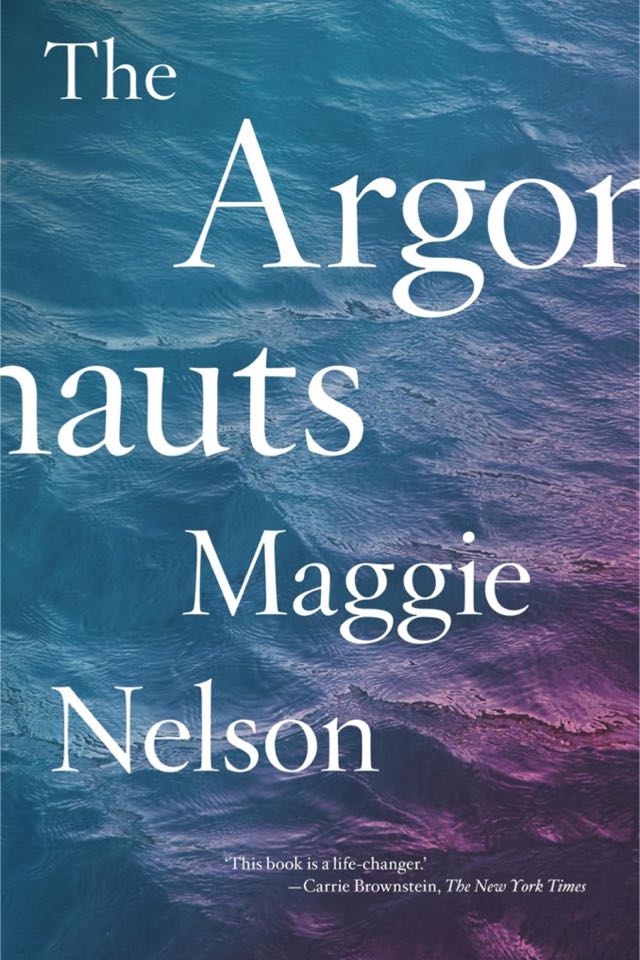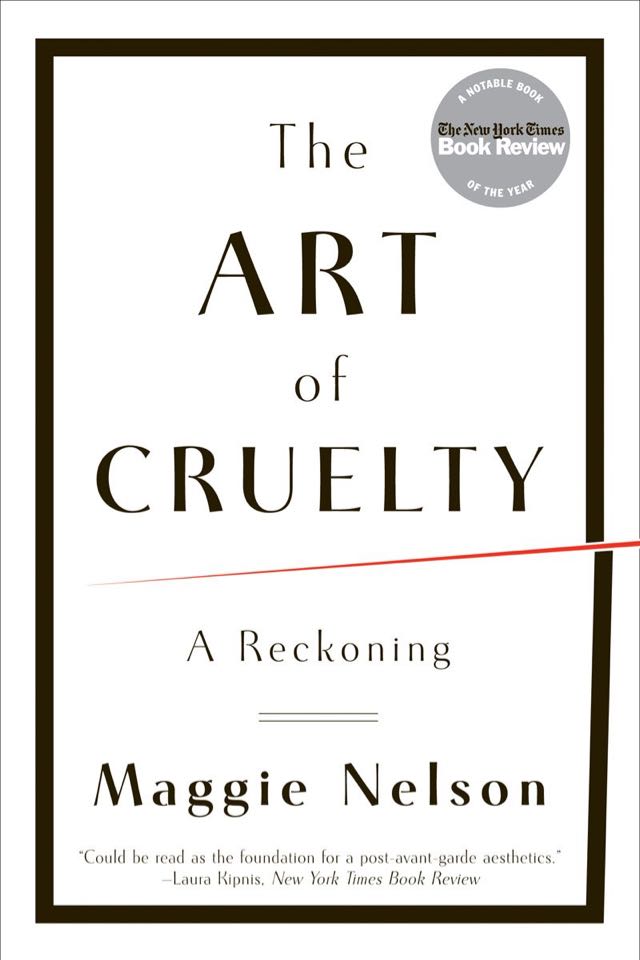An Interview with Maggie Nelson
— feature
Maggie Nelson is the American author of nine books: including several poetry collections; Jane, The Red Parts, and The Art of Cruelty, Nelson’s three-book discourse on violence; the cult classic, and ode to the colour blue, Bluets; as well as the critically acclaimed The Argonauts: a genre-defying work of auto-theory that circles her then burgeoning relationship.
Nelson writes in broad strokes in an unflinching manner. Shifting from philosophical musings to memoirist recollections, from critical analysis to discussions on violence and colour. Over the years her work has featured writing on feminism and queerness, violence and art, and the way they relate personally and societally.
Most recently, Nelson was the recipient of a 2016 MacArthur Fellowship, for her “extraordinary originality and dedication in [her] creative pursuits and a marked capacity for self-direction.” However, despite her continued success, she mentioned in our interview that she still “can’t imagine feeling satisfied, for better or worse.”
Maggie is currently reading: Geontologies: A Requiem to Late Liberalism by Elizabeth Povinelli.
Throughout December, Maggie was kind enough to take time out of her busy schedule to answer some questions from us.

In The Argonauts you wrote, “In other words, we were aging,” when discussing the bodily changes you and Harry were both experiencing. Whilst in a previous interview, you discuss Joan Didion’s thoughts on how her husband had looked upon her and seen a ‘layering of [all her previous] selves’. This view of how we grow in relationships is affecting, how are you able to internalise and, as evidenced by your writing, externalise these ever-present shifts?
NelsonYou just write all the changes down up until the book is due, and then there’s a kind of perverse pleasure, specific to autobiography, of knowing that there will be a million further changes that exceed the book’s purview, and that what you’ve made is but a snapshot of an ever-changing, ever-unfolding story. Even within the time period in question, there are many other changes, many other stories, that could have been told. Writing’s making a truce with all that; it’s an act of focus and exclusion. You don’t try to get everything in there.
wildness
Is that the appeal of the memoirist form to you—the way it parallels life, choosing what to engage with and what to pass by?
NelsonI don’t typically use the word “memoir,” and I don’t think there’s any one thing that could be called “the memoirist form.” I like the term life-writing. But yeah, I like the constraints of nonfiction; for me it emphasizes the art.
wildness
You mention that whilst writing you attempt to exist ‘within [the] experience’ and that you wish to veer from re-narrativising the past—that these ‘imaginings’ are a form of conversation between the past and your writing body. In The Red Parts you wrote about being unable to provide neat and tidy narratives, do you think the act of self-interpretation is necessary for a memoirist?
NelsonSelf-interpretation, hmm. Not quite sure what you mean. There is no single interpretation of self; there isn’t even one self; maybe there’s actually no self at all. I usually do learn some things about myself via writing, however, and I try to incorporate whatever I’ve found. So there’s that. I’m not afraid of meaning per se, but nor am I in search of it. Good, precise writing contains its own interpretative possibilities; if the sentences are right, you don’t have to chase meaning down. Any sense that one has found a meaning is usually just a pit stop, anyway.
wildness
What we mean is the way that all memory is reinterpretation, and whether you felt this ‘creative’ retelling of the past is a necessary limitation?
NelsonIt’s just the way it is. I don’t personally try to amp up the creative part of memory, as I know some writers do. I generally try to get closest to what I think happened, or what I think I felt, or what I feel now. Even within that effort, however, I inevitably misremember and misrepresent. It’s a neurological problem as much as, or more than, a writerly one.
wildness
You’ve spoken previously about writing ‘what [you] need and want to write,’ that the distinction between personal and public is not something you consider as preventative, but also, whilst not all “autobiographical writing is essentially an act of betrayal, it does nearly always make someone feel betrayed.” If it’s possible, how are you able to reconcile this paradox?
NelsonI don’t quite see the paradox. I mean, when you specifically cross a promise in life that you have made, that’s a more obvious betrayal. But since people don’t usually promise not to write down or publish about important elements of their life, it’s not as easy to find the bright line (unless the writer is intentionally spilling a secret that he/she knows to be such, I guess). I know it can feel hurtful to be represented by another, even when the representation is “positive,” the same way it feels crappy to overhear other people talking about you when they don’t think you’re there, even if they’re saying they like your dress or whatever. But just because ethics are complex doesn’t mean they’re not worth grappling with, negotiating.
wildness
Have there been any particular moments whilst writing where you’ve felt more aware of this negotiation taking place? How do you work through these feelings, is it simply a case of following the narrative?
NelsonI don’t worry while writing. I worry when deciding what to publish.
wildness
Your three earlier texts, Jane, The Red Parts and The Art of Cruelty, form a loose interconnected narrative of both personal and societal views of violence. How do you balance the differences between your deeply personal experience and society’s apparent obsession with cruelty?
NelsonThe work itself is the balance, performs the balance. I don’t see any opposition though between personal vs. societal views. People are sociality. It’s all one flow.
wildness
Your writing tends towards the visceral and you’ve talked of a desire to discuss sex more, not as an act of normalising, but as a way of layering nuance and creating a more honest and open representation of the personal you. This demystification of sexuality, and your own internal desires, are clearly important. Do you think we’re entering a period in which discussions on gender, sexuality, family, and love, are becoming broader? And, if so, what do you think the effects of this are?

I’m sorry to quibble so much with terms, but I don’t really recognize the desire to have a more “open representation” of something that could be called “the personal me.” I just write what I think the work needs. There are marvelously taboo-busting texts on all these accounts from over time, but yeah, generally speaking, since women or out-queers haven’t been adequately represented in the literary canon, or have been forced to suffer major ostracizations or punishments for speaking their truths, there is something of a boom right now. The effects are hugely positive—people feeling less alone being one of them. We’re going to need all this bravery for the Trump years, just as we’ve needed it all along.
wildness
You’ve discussed previously some of the people who’ve greatly influenced you and your writing, including Annie Dillard and Eileen Myles. How have they influenced you directly? Also, do you feel a need to give back, as they have with you, to others?
NelsonI think I give in the writing, mostly, but also as a teacher, and just by being. I don’t think of it as “giving back” per se. And mentoring doesn’t always mean holding someone’s hand. It’s often just by example. When I met Eileen and Annie, I just imbibed who they were, what they wrote, more than I got any literal help. We can be for each other beacons of possibility. Often that’s the most important thing.
Read more from Issue No. 7 or share on Twitter.